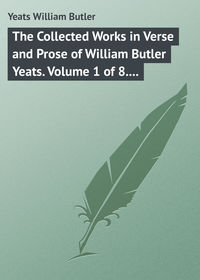Kitabı oku: «The Collected Works in Verse and Prose of William Butler Yeats. Volume 1 of 8. Poems Lyrical and Narrative», sayfa 8
EARLY POEMS:
Ballads and Lyrics (p. 89). ‘The Rose’ (p. 139). ‘The Wanderings of Oisin’ (p. 175)
When I first wrote I went here and there for my subjects as my reading led me, and preferred to all other countries Arcadia and the India of romance, but presently I convinced myself, for such reasons as those in ‘Ireland and the Arts,’ that I should never go for the scenery of a poem to any country but my own, and I think that I shall hold to that conviction to the end. I was very young; and, perhaps because I belonged to a Young Ireland Society in Dublin, I wished to be as easily understood as the Young Ireland writers, to write always out of the common thought of the people.
I have put the poems written while I was influenced by this desire, though with an always lessening force, into those sections which I have called ‘Early Poems.’ I read certain of them now with no little discontent, for I find, especially in the ballads, some triviality and sentimentality. Mangan and Davis, at their best, are not sentimental and trivial, but I became so from an imitation that was not natural to me. When I was writing the poems in the second of the three, the section called ‘The Rose,’ I found that I was becoming unintelligible to the young men who had been in my thought. We have still the same tradition, but I have been like a traveller who, having when newly arrived in the city noticed nothing but the news of the market-place, the songs of the workmen, the great public buildings, has come after certain months to let his thoughts run upon some little carving in its niche, some Ogham on a stone, or the conversation of a countryman who knows more of the ‘Boar without Bristles’ than of the daily paper.
When writing I went for nearly all my subjects to Irish folklore and legends, much as a Young Ireland poet would have done, writing ‘Down by the Salley Garden’ by adding a few lines to a couple of lines I heard sung at Ballisodare; ‘The Meditation of the Old Fisherman’ from the words of a not very old fisherman at Rosses Point; ‘The Lamentation of the Old Pensioner’ from words spoken by a man on the Two Rock Mountain to a friend of mine; ‘The Ballad of the Old Foxhunter’ from an incident in one of Kickham’s novels; and ‘The Ballad of Moll Magee’ from a sermon preached in a chapel at Howth; and ‘The Wanderings of Oisin’ from a Gaelic poem of the Eighteenth Century and certain Middle Irish poems in dialogue. It is no longer necessary to say who Oisin and Cuchulain and Fergus and the other bardic persons are, for Lady Gregory, in her ‘Gods and Fighting Men’ and ‘Cuchulain of Muirthemne’ has re-told all that is greatest in the ancient literature of Ireland in a style that has to my ears an immortal beauty.
